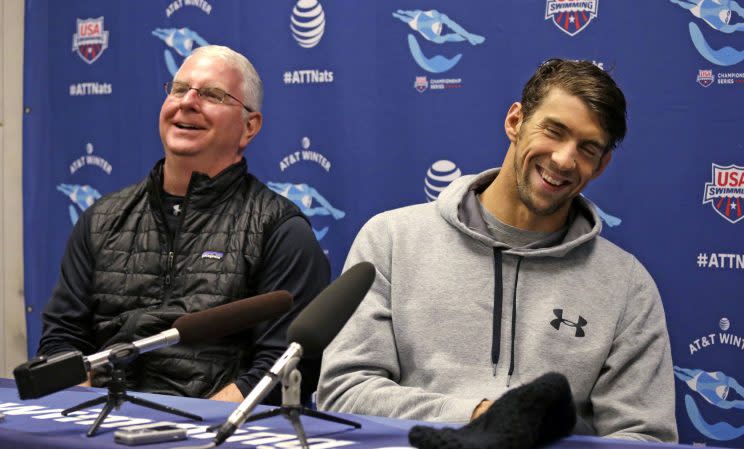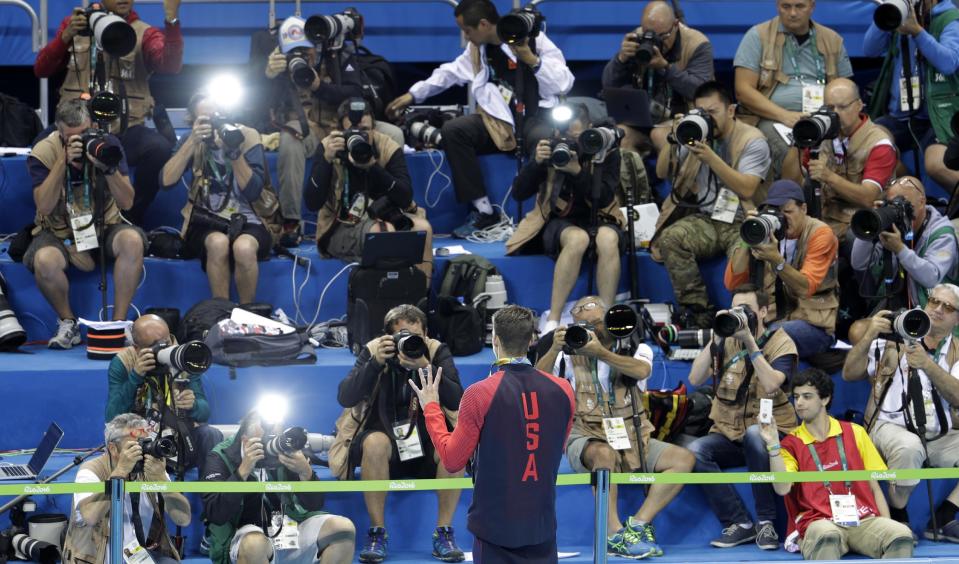The complicated relationship that molded Michael Phelps into the greatest
Medal count | Olympic schedule | Olympic news
RIO DE JANEIRO – It was mid-May 2014, and Michael Phelps was out of retirement. It was big news. He was making his return to competition at a meet in Charlotte, N.C., and his first event back was the 200-meter freestyle.
He was awful.
Phelps finished ninth in the preliminaries, not even qualifying for the championship final. His time was nearly nine full seconds slower than the 2008 world record he set in that event in Beijing. Suddenly this comeback thing seemed like a very bad idea.
“I thought, ‘What the hell am I doing swimming again? I’m so slow. This is terrible,’ “ Phelps recalled here Thursday night. “I just had to trust Bob. I’ve trusted him since I was 11 years old. I had to keep trusting him. I knew he wouldn’t let me down.”
Phelps told that story after winning his fourth gold medal here, destroying the field in the 200 individual medley. Friday night he will go for a fifth, in the 100 butterfly. Saturday could be a sixth on the medley relay. This Olympic performance pushes light years beyond the boundaries anyone thought possible when Phelps launched that comeback – when he was a ninth-place swimmer in Charlotte and wondering what he’d done to himself.
Trust In Bob got him here.
It has been Phelps’ credo for 20 years now, a credo that has carried a hyperactive kid to the pinnacle of Olympic achievement. North Baltimore Aquatic Club coach Bob Bowman entered young Phelps’ life and began planning an ambitious future for the precocious talent.
It would turn out far better than either could have dreamed – and they dreamed big.
The partnership between Bowman and Phelps has been unbreakable ever since – though Phelps has tried several times to sever those bonds. The result is one of the great coach-athlete relationships in the history of American sport – arguably the greatest one.
The comparable 21st century combinations are few. There is Gregg Popovich-Tim Duncan, and there is Bill Belichick-Tom Brady. Both of those have spanned a sporting eternity: Belichick-Brady heading into year 17 and counting; Pop-Duncan finally parting after 19 years together. Both resulted in a fistful of championships, as the player became the tone setter for everything the coach preached to his entire team.
But here is the key distinction that separates Bowman-Phelps into it’s own special category: Bowman essentially helped raise Phelps from childhood to manhood.
Their relationship began before Phelps had even reached puberty, and it began at a time when the swimmer’s relationship with his father, Fred, was waning. Debbie Phelps did a remarkable job raising Michael, and he was close with his sisters (particularly Hillary). But much of the male guidance in his life came from the demanding swim coach with the South Carolina accent who kept pushing him in the pool.

In August 1997, Bob Bowman had seen enough to know. He called Debbie and Fred Phelps in, along with Michael, to the NBAC office for a meeting.
The message was simple but powerful: your son has a chance to make the Olympic team in 2000, and absolutely will make it with a chance to earn medals in 2004. According to Bowman’s book, “The Golden Rules,” Debbie Phelps looked at him and said, “You’re crazy, Bowman.”
He was crazy. He underestimated Phelps.
But Bowman told Phelps’ parents that a plan had to be put in place right then, when Michael was 11. He needed to stop playing baseball and lacrosse, and transfer “to a school where his teachers would support his swimming efforts.” And he needed to attend every practice, both in the mornings and afternoons.
It was a lot to ask, but Phelps trusted in Bob. In 2000, the trust was rewarded and the vision fulfilled – he was the youngest American Olympian at age 15. By 2004, Phelps was winning six medals, fully launching himself to the top of the sport.
That Athens Olympics was the initial swing at all-time greatness. Mark Spitz’s seven-gold haul in 1972 was the ultimate performance, and Phelps took aim at it. He didn’t quite get there, settling for six golds and two bronze, but it became clear that Phelps in his prime would have a shot at it.
Four years later, in 2008, he surpassed Spitz with the eight-gold masterpiece. It was his defining work, an artist in his prime.
Problem was, Phelps was only 23. He had plenty of good swimming years ahead of him – if only Bowman could keep him happy and motivated. What followed were the Dark Years.
There were many mornings when Bowman would stand on deck with his stomach in knots, wondering whether his star would show up. Often he didn’t. Sometimes he showed up hung over.
For Bowman, who is a meticulous planner and a resolute believer that great swimming achievements are built years in advance by consistent training, this was a nightmare.
“I don’t know that he ever did a whole week of practice, from Beijing to London,” Bowman said. “He did two Saturday mornings the entire quad.”
Six weeks before Olympic Trials, Bowman essentially put Phelps in training jail and wouldn’t let him out. Phelps made the team in four individual events – a testament to ridiculous talent and toughness, not to conditioning.
Adding three relays, he swam seven events in London. The results were great for a mortal – four gold medals, two silver. But Phelps missed the podium in an event he had dominated, the 400 IM, and was beaten at the touch in his signature event, the 200 butterfly. Not coincidentally, those might be the two most conditioning-intensive events outside of distance freestyle.
Bowman talks a lot about deposits in the bank in practice, and withdrawals on race day. Phelps was overdrawn.
“He was doing the bare minimum,” Bowman said.
But here was the testament to the relationship: not even Phelps’ abdication of Bowman’s training demands could break the bond. When Phelps decided to come back in 2014, there was only one coach he would call. And he knew Bowman would answer.
The two had dinner and talked it out. Bowman told Phelps it had to be different this time, and Phelps agreed. The last chapter would be harmonious. Or so they thought.

Michael Phelps complicated the comeback with his second DUI late in 2014, resulting in a rehab stay that helped change his life for the better. Fred Phelps visited, helping repair their relationship. Bob Bowman visited twice as well.
Bowman is a famously hard-core coach. He is intense on the pool deck and demands dedication from his swimmers. He’s not easy to train for. Many have left his training group because they couldn’t handle his coaching style.
But he has found a soft side when the swimmers he is closest to needed it. This is part of his own evolution.
When 2012 Olympic star Allison Schmitt suffered from depression, Bowman helped her through. A lifelong bachelor, he wasn’t exactly wired into that side of women swimmers, so he sought advice from Cal coach Teri McKeever, who gave him the book, “The Female Brain.” He learned and adapted his approach, supporting more than prodding.
He’s done the same with Phelps. There is less head-butting now, more talking, more give and take. The relationship is a deep friendship, something that will last far beyond the end of Phelps’ unparalleled swimming career.
Bowman surprised himself a bit the other night here, sitting in the stands for the women’s 800 freestyle relay with Debbie Phelps and Michael’s fiancée, Nicole Johnson. Schmitt was in the water, the final swim of her career, but Bowman’s attention kept drifting to Michael and Nicole’s baby boy, Boomer.
“I can’t believe I did that,” Bowman said.
Boomer Phelps’ middle name is Robert. He is named for the only coach Michael Phelps ever needed to become the greatest ever.


